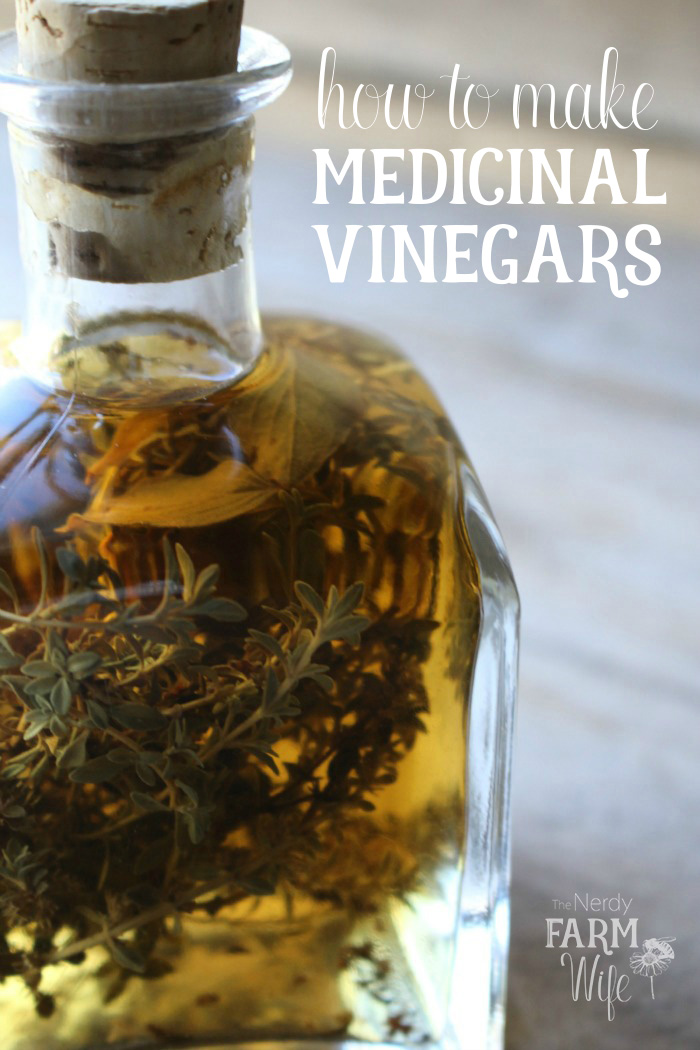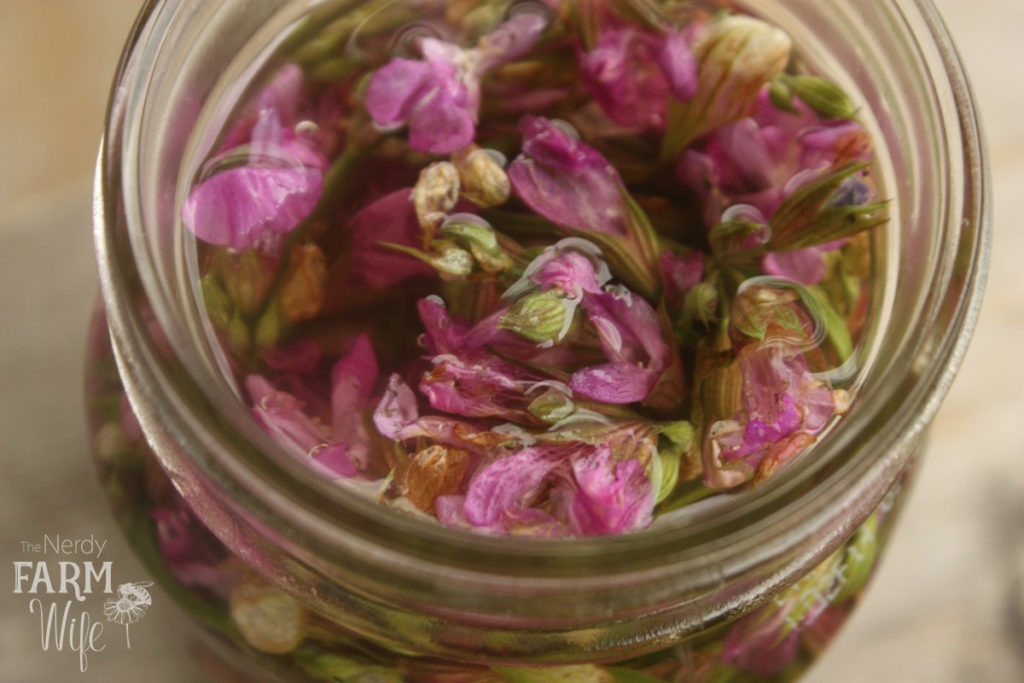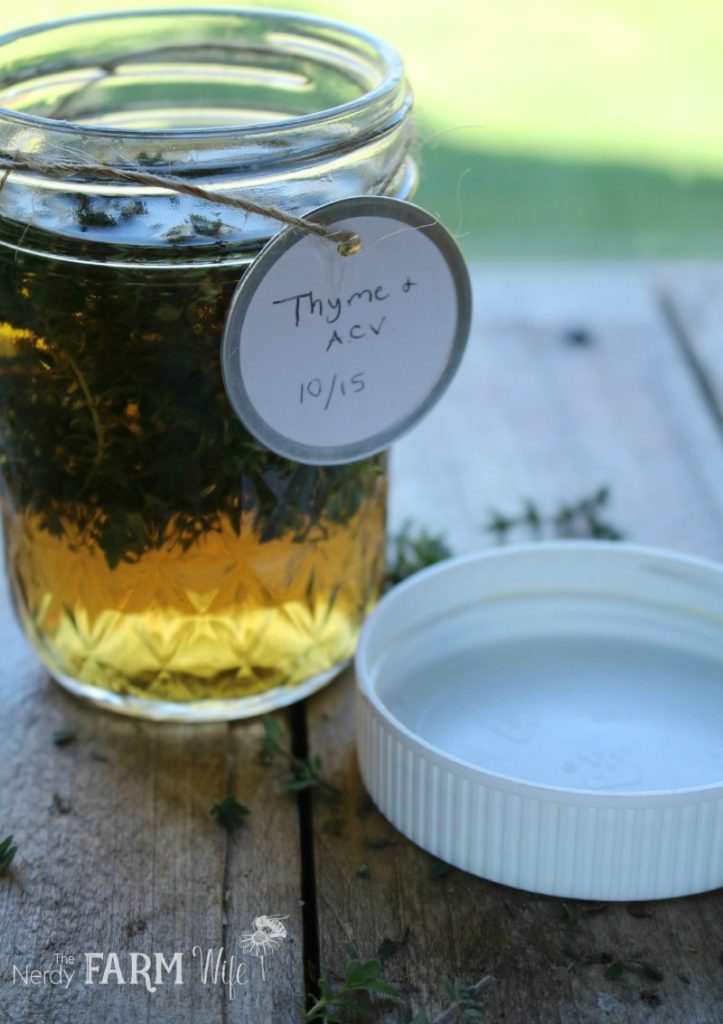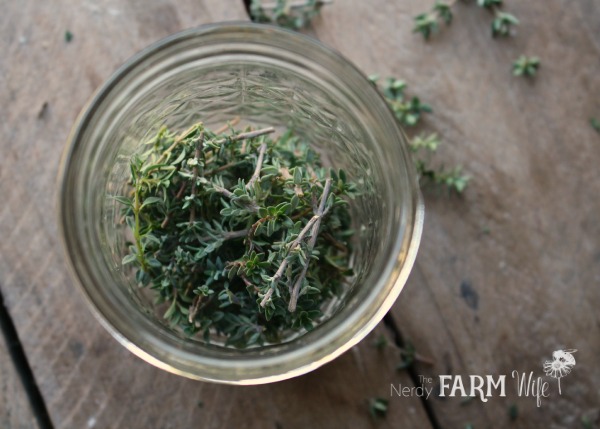How to Make Medicinal Vinegars & Oxymels

Medicinal vinegars (Vinegar Extracts) have been around since ancient times and were an excellent way to preserve and dispense herbs before distilled spirits were known about.
While alcohol-based tinctures tend to be stronger and have a longer shelf life, vinegar extracts (also known as “aceta”) are ideal for those who want to avoid the use of alcohol, and its additional cost. Vinegars are also really good a drawing minerals and vitamins from a plant.
Add those extra nutrients to the already established benefits of apple cider vinegar and you have a great option for your herbal remedies toolbox!

Making a Medicinal Vinegar (Vinegar Extract):
According to my well loved book, Making Plant Medicine, by Richo Cech, the standard formula to follow is 1 part dry herb to 7 parts vinegar.
I’m not always that precise when I make herbal remedies – I’m something of a “pinch of this and a pinch of that” type. That works too! Don’t let the feeling of having to be SO precise or the world will end, keep you from trying your hand at making this type of stuff. It’s hard to mess it up!
Cover tightly, shake and store in a cool, dark place to infuse (or macerate) for about two or three weeks, shaking daily. (If you are better at remembering than me!)
Make sure that you use a plastic top or a layer of plastic wrap or wax paper between the jar and a metal lid. Otherwise, the vinegar will eat away at the metal and ruin the whole batch.
Dry herbs generally make a stronger extract than fresh and have a longer shelf life. If you do use fresh plants, be sure to store in a cool place or even better, the refrigerator.
Vinegar Extracts (aceta) have a shelf life of around 6 months, if not longer.
Some links on this site are affiliate links. I only recommend products I personally use and enjoy.

Dosing a Vinegar Extract:
While there are people that have no problem with the taste of straight vinegar, I am not one of them!
To dose, I mix with an equal part of honey. (By doing this, you are making a most basic of oxymels – more on those in a minute.)
Drink some water after taking and swish your mouth out a bit as you do. Vinegar should not stay against the teeth for long, as it’s not good for them. Even better, put your spoonful into a cup of plain water, juice or even ginger ale and then drink.
Two to three teaspoons at a time, up to five times per day, is the usual dose.
Be careful taking vinegar on a routine daily basis though. I do realize that some do and are perfectly fine doing so, but if you are on medications, struggle with low blood potassium, or are just unsure of how it will affect you, check with your doctor or naturopath first.

Making an Oxymel:
An oxymel is just a sweet and sour herbal syrup.
It contains:
- vinegar
- honey
- herb(s)
Oxymels are beneficial for respiratory conditions, so the herbs contained therein will usually reflect that.
For the cold method of making an oxymel:
Fill a small jar about half to three-fourths full of herbs. Pour honey over them, then vinegar. Use about 1/3 of the jar filled with honey to 2/3 of the rest vinegar OR for a sweeter syrup, try 1/2 jar honey and 1/2 jar vinegar. It’s a very flexible amount.
Both honey and vinegar act as preservatives, so you’re not going to ruin the mixture by altering the ratios. Stir it all together; it might not blend well at first, that’s okay. Just stir or shake it every day for about two weeks, then strain the herbs out, bottle it up and store in a cool place or the refrigerator.
For the hot method of making an oxymel (faster):
Simmer your herbs and vinegar together for ten to twenty minutes. Strain out and stir in honey while the vinegar is still warm.
How to Use Oxymels
Take oxymels by the spoonful, as needed, for sore throats, thick congested coughs, or as a general treatment to combat cold and respiratory symptoms.
The shelf life for oxymels is about 9 months to 1 year.
Sample Recipe: Rosemary-Sage Oxymel
- a handful of rosemary sprigs
- a handful of sage leaves
- 1/3 of the jar filled with honey
- topped off with apple cider vinegar
This is a good one to keep on hand specifically for upper respiratory infections. (Not intended for pregnant or nursing women.)

A few herbs to consider when creating medicinal vinegars or oxymels (not an exhaustive list, by any means):
- Rosemary: Useful for low energy and poor circulation, good for digestion and nerves. Avoid daily use or medicinal levels if pregnant.
- Sage: antifungal, antibacterial, antiviral. Contraindications: dries up milk flow, not for medicinal use by pregnant or nursing women, do not take for an extended amount of time.
- Thyme: for upper respiratory infections, coughs, bronchitis, antiviral and antibacterial
- Oregano: antibacterial, antiviral, useful for upper respiratory infections
- Bee Balm (Monarda): sore throat, antibacterial, helpful for thick congested coughs, fever
- Mint: stomach soothing, digestive aid
- Rose Petals: astringent, anti-inflammatory
- Elder Flowers: specific for sore throats, immune stimulating
- Raspberry Leaves: general tonic for women
- Lemon Peel: can be added for flavor
If you’re unable to grow your own herbs, Mountain Rose Herbs is my favorite resource for high quality, organic dried herbs.


You explain this in terms I can understand thank you! I love being able to use natural herbs and spices rather than medication, I can’t wait to make my own remedies! Thank you again!!
I’m glad you found the post useful!
Very interesting post! I’m going to do more research on this. I’d love to learn more on herbal remedies. I especially appreciate your list of herbs and their uses – gives me a place to start! Thanks!
Hi Tammy, thanks! I’m glad you found the information helpful. :)
Thanks for teaching me about “oxymels”. Do you use dry or fresh herbs when making them?
You can use either! :) I often mix and match fresh and dry in the same batch, depending on what I have on hand. If it’s a fresh ingredient, I use more of it and if it’s dried I use less. i.e. measure fresh by the handful and dried by the spoonful or even pinches
This is very interesting! I haven’t really thought of doing medicinal vinegars before.
Hi Lisa! They aren’t my favorite to take, taste-wise, but I do think it’s handy to know how to make them! :)
I love this, Jan! I am going to make some up for my family.
Question: Can I use plastic jars with plastic lids or is glass a must?
Plastic should work just fine! The main thing is to avoid metal.
Awesome! I was thinking of mixing garlic and thyme, and maybe adding some lemon peel.
Hmmm… I wonder how it would taste on chicken… ? hahaha
Haha might be good on chicken! ;) That sounds like an excellent combination!
I have my 7 year old drinking some right now.. poor kiddo has a sore throat. I haven’t had the chance to get the ingredients that I was going to use, so we went with garlic, sage, and a handful of fresh cilantro. lol I mixed the vinegar with mountain flower infused honey. :-)
Aw I hope their throat feels better soon!! I don’t use cilantro outside of a tiny bit in salsa, but I know of several people that use it for detoxification purposes. So, you might want to be cautious about using it medicinally in case it triggers symptoms that you won’t want to deal with (like possibly rashes, diarrhea, queasiness etc.) Garlic & Sage sounds perfect though. :) And, that Mountain Flower Infused Honey – YUM!
Is mountain flower the same as what I know of as fireweed? I just know it is one of the first plants to grow AFTER a forest fire or meadow fire. I also know it’s less sweeter than most honeys (which is why I like it) and it sure helps with respiratory distress, in my case asthma. I mix it with thyme and sage, now I’ll try adding the garlic for preventing those attacks. I will need this with spring upon us.
Hi Dee! I’m not very familiar with fireweed, I don’t believe it grows around here.
I like that the herbs you use are fairly common and easily grown in the summer garden. Thank you for sharing this interesting post at Rural Thursdays. :)
Thanks Nancy! :)
I made two of these today the one for respiratory and digestive I cooked both of them but in separate pans. Is it okay to leave them out or should they be put in the fridge? And was it ok to boil ginger with the mint? They are both good for digestive system right.
I like to store mine in either my refrigerator or my very cool basement storage area. It’s good to avoid light and high heat areas, to extend the shelf life.
Ginger and Mint are both great for the digestive system! Definitely fine to combine together. :)
Thanks for linking up with the Clever Chicks Blog Hop!
I have been making my own raw Apple Cider Vinegar with the mother for the better part of the past year and I think it may be time to start experimenting with some new applications!
Have a great weekend and I hope to see you back again on the next hop!
Cheers,
Kathy Shea Mormino
The Chicken Chick
Thanks Kathy! I love the idea of making my own Apple Cider Vinegar; it’s on my want-to-try-soon list!
What exactly are all the uses for this?
It really depends on what type of herb you use, as to what it does. It’s just another medium of delivering herbs to your body like a tincture, tea, capsule, etc. Traditionally though, oxymels are mostly used for respiratory afflictions, colds and coughs. Some herbs don’t release as many beneficial constituents into vinegar, which is why I primarily prefer alcohol based tinctures for their greater potency with a smaller dose required. Many people don’t want to use alcohol though, so this gives a viable (if weaker) alternative. :)
I like this as I cant do the alchol tintures at all, as my gallbladder doest like it-I just made a dandeline root burdoct root and and mint one now for 2 weeks to pass by
That’s great that you got some made – hope they work well for you! :)
Thanks for this great info!
Can the common white rice vinegar work? Or is there a specific vinegar to use?
Hi! For medicinal purposes I usually use apple cider vinegar. It has a lot of benefits, just by itself, that are an added bonus to the herbs. Other vinegars should work just as well to extract herbal properties though!
Thanks! :)
i was wondering if mixing the herbs together in one jar be ok? i was wanting to do oregano,thyme,ginger,rosemary and mint.
Hi Jenifer, yes, you can mix everything together in one jar. Sounds like a great combination!
I made the ginger/garlic/onion/lemon peel combo, it is macerating now, can’t wait for the 2 wks to be up, spring is coming, I would like to be prepared for the summer, I live in elderly housing apt/complex, I am often sharing natural remedies, salves(working progress) before I came and started hosting a weekly potluck, these elders used artificial sweetners, when I took over the kitchen, I told them that I couldn’t with a good conscience poison them any further and since then introduced to them natural medicine, remedies, teas and many other natural “stuff” and slowly got them off refined sugar and back to natural instead of canned or processed foods, I am one of the youngest elders here and often share “new” natural recipes/remedies and I often go to this website and these comments really help, just letting you know, the several lives that are affected by this website and how it helps alot of elders. Thanks so much, Pam
Aw, thank you so much for letting me know that Pam. :) I think it’s awesome that you’ve made such a difference in the lives of your friends as well! If you ever have questions or need help with something, please let me know!
I am using this method at our house for seasonal allergies, working good so far!! I used mullen and mint with the vinegar and honey. Much easier for my little guy to handle this way!!
That’s great to hear and a really good idea! :)
Great suggestions! Thank you for sharing and please keep them coming!
Hi Carlton, glad you found the information useful!
very interesting indeed. I swear by the garlic , onion , radish, honey and lemon recipe. really clears up cold symptoms in a couple days! I was noticing you use ginger and I wonder if I should add some of that to my recipe, and would the ap cid vinegar work in place of the lemon juice, would it be any more beneficial? thanks for sharing your wisdom.
Hi Sally! If you like your recipe with the lemon juice, then I would keep using that. Personally, I like the taste of lemon juice better, so it sounds great to me! :) I love using ginger – I end up adding it to almost every cold/flu/stomach ache concoction I come up with. If you’re not on blood thinners or have medical reasons not to use it, then I think it always make a great addition.
I have powdered herbs( I use for my horses).Can I also use some of these same powdered herbs to make Oxymels or Medicinal Vinegars for myself?
Hi Julie! They should work in the same way – the only thing to watch for is that powders have a tendency to settle in a solid clump at the bottom of the jar. So, be sure to shake them up well and more often.
I have done vinegar infusions with citrus peels cinnamon sticks and even lemon grass for cleaning and it works really well…However I have been wondering how it would work with vanilla beans and if I would be able to use the infusion in baking etc as I am against the consumption of alcohol….your input is appreciated!
Hi Naomi! I have some vanilla bean vinegar that I’ve been brewing for probably 5 months or so now. I just opened it up to smell how it’s doing. It has a light edge of vanilla scent, but the vinegar smell is still quite strong. There’s also the matter that vinegar is going to change the acid/base ratio in any baked goods. Something that might work better for you is a vanilla glycerite. (Vanilla Beans, covered with vegetable glycerin instead of alcohol.) There’s also powdered vanilla you can buy. I used it all the time when my son had bad allergies and it worked wonderfully!
Thanks so much for the reply….and the info!
Jan Everything is very interesting
I and I have done some of you tintures but I was just wondering eing if you have something for
Incontinence.
Hi Maria, I’m glad you found the information interesting! I think the only thing I have on the site, that might help with that would be corn silk. Here’s the article, if you’d like to check it out! https://thenerdyfarmwife.com/uses-for-corn-silk/
Love your site. So informative.
Thanks Donna! :)
What type of vinegar should I be using??? I love your Facebook page and website
Hi Katie, I’m happy to hear you like the site! :) For medicinal purposes, raw apple cider vinegar is the best.
I am not sure if I ruined my sage oxymel. I accidentally placed the sheet of plastic over the lid between the screw top last Sunday (today is Thursday). There doesn’t seem to be any damage to the lid. How do I know if my oxymel has been compromised?
Hi Angelique! For just those few days, I think you’ll be okay. I’ve forgotten the plastic layer before & didn’t discover it until several months had gone by. The lid was visibly corroded and there was a metallic smell when I opened the jar. I think it’s more a precaution for long term storage.
Thank you so much for the explanations. I can’t use alcohol so I’ve been using vinegar for many things, never considered adding honey since I don’t have a ‘sweet’ tooth. Last October I made up Vinegar of the 4 Thieves for colds but mostly for flu since I don’t do the shots. Come December and the first signs of a cold I started dosing what I thought was a head/chest cold. My daughter swears it was the flu. I wasn’t consistent, WOW, I was still sick but nothing compared to prior illnesses. I have shared what I had made up with similar results. Now I have a full quart made up awaiting anything. I’ve also found it works great as a general tonic. O yes, as an insect repellent for dog collars too. ;)
Hi Dee, Your vinegar sounds great! I like 4 thieves mixtures for cleaning during flu season too – it’s wonderful stuff! Thanks for sharing your experiences and tips with us and I’m happy you’re feeling better! :)
hi. like kathy mormino, i too make my own apple cider vinegar. i was wondering if the dried herbs can just be put into the same vat that the “almost vinegar” is fermenting in. do you have any opinion on that? it was save me a step. i suppose what needs to be considered is that there are microbes at work fermenting the apples/cider/juice (whatever one uses to make acv). the question is whether or not that activity would interfere or possibly enhance the extracting process.
Hi Roberta, That’s a very interesting idea! I wonder too, if certain herbs will exert some type of effect on the fermentation process since some are antimicrobial… but on the other hand, some herbs are used to make wine (thinking of elderberry, dandelion & such) and that doesn’t hinder anything in that fermentation process, that I know of. I wish I knew a better answer, but I like how you’re thinking outside of the box with that idea!
Can an oxymel be made with a mead instead of raw honey? How about using a 25 year old balsamic?
Hi Myron! Mead can’t replace honey in oxymels (they have differing properties), but it’s possible the balsamic could work in place of apple cider vinegar.
I would make a little test batch to try out & see how it goes! :)
Hi, thank you for the great information. can you please tell me a) how will I know if I’ve got it right? and b) how will I know when the oxymel is past its use-by date?
Hi Sharon! It’s hard to mess up an oxymel – if it’s too acidic for you, just stir in more honey. (And vice versa – could add more vinegar for a tangier oxymel.)
I’ve actually never had an oxymel go bad before I used it up, and only once had a vinegar spoil – I had used fresh herbs, they didn’t stay submerged, AND I forgot to strain them out for months.
In that case, there was a clearly unpleasant smell, some black growth in the vinegar, and a slimy look to the leaves.
If you’re worried about shelf life when you’re just starting to dabble in oxymels, one thing you can do is use dried herbs and refrigerate your oxymel and try to use it up within 5 or 6 months. That way you know it’s good and fresh for you! :)